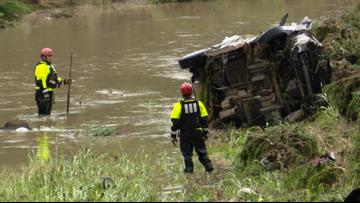- Why no hurricanes made landfall in the US in 2025
- Florence to begin interviewing police chief finalists in January
- A West Texas county wants to better prepare for floods. Paying for it will be tricky.
- They couldn’t save their daughters’ lives in the July 4 floods. Now they’re dealing with the grief and the guilt.
- Austin could see heavy rains, possible flooding over the next few days
City of San Antonio to investigate what caused last week's deadly flash flooding after officials recover 13 bodies

The findings will be shared at some point in the future, City Manager Erik Walsh said.
SAN ANTONIO — Officials plan to investigate what factored into last week’s sudden and deadly flooding emergencies that have left some families grieving, according to an email sent by City Manager Erik Walsh to other San Antonio leaders Monday. They are also analyzing the total cost of damage the storms left behind to “key infrastructure.”
Thirteen people ranging in age from 28 to 67 years old died after their cars were slammed by fast-moving water the morning of June 12, when slow-moving storms dumped more than 6 inches of rain in the Alamo City. Most of those bodies were found in the area of Austin Highway and Perrin Beitel on the northeast side, where floodwaters carried a line of cars that had been stuck in traffic into nearby creek beds.
The San Antonio Fire Department (SAFD) responded to at least 70 calls for high-water rescues last Thursday as families raced to reconnect with loved ones who were on the road. Search-and-rescue efforts led by SAFD ended over the weekend, when all of those reported missing were recovered.

The city’s investigation will include the City Attorney’s Office, Public Works, the San Antonio Police Department and SAFD, Walsh wrote in his email, and will look into flooding in Beitel Creek and Leon Creek.
“The analysis will include independent engineering and expert evaluation of what factors may have contributed to these events,” Walsh wrote. “These reviews will gather data from the events and provide a robust analysis of what occurred based on the facts.”
The city will share its findings at some point in the future, according to Walsh.
City Councilman Jalen McKee-Rodriguez, who represents the east side and has been one of council’s staunchest advocates for improved infrastructure, said the “profound tragedy” represents “why a commitment to equitable investment in our community matters.”
“San Antonio continues to have great infrastructure need, but it’s clear the city cannot do it on our own and we’re going to need greater investment from the county, state and federal government if we’re ever going to meet that need,” McKee-Rodriguez said in a statement. “We are a community at great risk of natural disasters, and it’s unclear how this could have been prevented. What matters most is that lives have been lost and as a community we need to evaluate our priorities.”
This is a developing story.